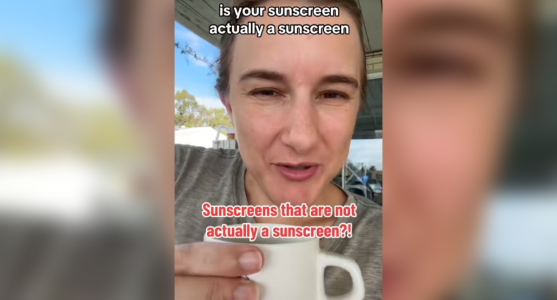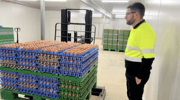This Nurse Reveals the Startling Truth About Your Sunscreen—What You Don't Know Could Harm You!
By
- Replies 7
As Australians, we're no strangers to the harsh rays of the sun. With skin cancer rates among the highest in the world, slathering on sunscreen is as much a part of our daily routine as brushing our teeth. But what if the sunscreen you trust to protect you and your loved ones isn't up to the task? A recent revelation by an Aussie nurse on TikTok has many of us reevaluating our sun protection choices.
The sun-kissed Aussie lifestyle comes with a significant caveat: the need for vigilant sun protection. We've all heard the Slip, Slop, Slap slogan, but it turns out that not all products marketed for sun protection meet the stringent standards required to truly safeguard our skin. This is particularly concerning for our over-60s community, who may have spent years under the assumption that their chosen sunblock was providing adequate defence against UV radiation.
Dr. Jess, an Aussie nurse and TikTok creator, has shone a light on a concerning trend among some Australian small businesses. These companies, she explains, are skirting around regulations by avoiding the term 'sunscreen' on their products. Instead, they opt for names like 'sun stick', 'sun balm', or 'Tallow Balm with SPF'. While these products may claim to offer sun protection in their marketing materials or on social media, without proper registration, there's no guarantee they're effective.
The Therapeutic Goods Administration (TGA) in Australia has a rigorous process for approving sunscreens. These products must be included on the Australian Register of Therapeutic Goods (ARTG) to be legally sold as sunscreens. Dr Jess advises consumers to check the ARTG for their product's brand or name. If it doesn't appear, the product isn't officially recognized as a sunscreen, and its protective claims are unverified.
For those of us who grew up when sunscreen was a new concept, and sunbathing was the norm, this news is particularly jarring. We now understand the importance of protecting our skin, but this information suggests we may have been misled by clever marketing.
The response to Dr. Jess's video was a mix of outrage and gratitude. Many were shocked that such practices could occur in a country where sun safety is paramount. Others were thankful for the eye-opening information, with some discovering that products they used on their own children weren't listed on the ARTG.
So, what should you do to ensure your sunscreen is effective? First, stick to reputable brands that have a proven track record of meeting Australian sun protection standards. Major brands like Mecca Cosmetica, Bondi Sands, Neutrogena, and the Cancer Council are all safe bets. Additionally, many commendable smaller businesses have made the cut, offering peace of mind to those who prefer to support local enterprises.
It's also worth noting that the TGA assigns an 'AUST L' number to approved sunscreens, which you can find on the product's packaging. This number is a clear indication that the sunscreen has passed the necessary tests to ensure it provides the level of protection advertised.
For our senior community, it's never too late to start taking sun safety seriously. Whether you're gardening, hitting the golf course, or enjoying a beachside stroll, make sure your sunscreen is TGA-approved. Remember, sunscreen is just one part of a comprehensive sun protection strategy that includes wearing protective clothing, seeking shade, and wearing a broad-brimmed hat and sunglasses.
Credit: TikTok
 We'd love to hear from you, our Seniors Discount Club members. Have you ever encountered a sunscreen product that didn't live up to its promises? How do you ensure you're getting the best protection possible? Share your experiences and tips in the comments below, and let's help each other stay sun-safe under our beautiful Australian skies.
We'd love to hear from you, our Seniors Discount Club members. Have you ever encountered a sunscreen product that didn't live up to its promises? How do you ensure you're getting the best protection possible? Share your experiences and tips in the comments below, and let's help each other stay sun-safe under our beautiful Australian skies.
The sun-kissed Aussie lifestyle comes with a significant caveat: the need for vigilant sun protection. We've all heard the Slip, Slop, Slap slogan, but it turns out that not all products marketed for sun protection meet the stringent standards required to truly safeguard our skin. This is particularly concerning for our over-60s community, who may have spent years under the assumption that their chosen sunblock was providing adequate defence against UV radiation.
Dr. Jess, an Aussie nurse and TikTok creator, has shone a light on a concerning trend among some Australian small businesses. These companies, she explains, are skirting around regulations by avoiding the term 'sunscreen' on their products. Instead, they opt for names like 'sun stick', 'sun balm', or 'Tallow Balm with SPF'. While these products may claim to offer sun protection in their marketing materials or on social media, without proper registration, there's no guarantee they're effective.
The Therapeutic Goods Administration (TGA) in Australia has a rigorous process for approving sunscreens. These products must be included on the Australian Register of Therapeutic Goods (ARTG) to be legally sold as sunscreens. Dr Jess advises consumers to check the ARTG for their product's brand or name. If it doesn't appear, the product isn't officially recognized as a sunscreen, and its protective claims are unverified.
For those of us who grew up when sunscreen was a new concept, and sunbathing was the norm, this news is particularly jarring. We now understand the importance of protecting our skin, but this information suggests we may have been misled by clever marketing.
The response to Dr. Jess's video was a mix of outrage and gratitude. Many were shocked that such practices could occur in a country where sun safety is paramount. Others were thankful for the eye-opening information, with some discovering that products they used on their own children weren't listed on the ARTG.
So, what should you do to ensure your sunscreen is effective? First, stick to reputable brands that have a proven track record of meeting Australian sun protection standards. Major brands like Mecca Cosmetica, Bondi Sands, Neutrogena, and the Cancer Council are all safe bets. Additionally, many commendable smaller businesses have made the cut, offering peace of mind to those who prefer to support local enterprises.
It's also worth noting that the TGA assigns an 'AUST L' number to approved sunscreens, which you can find on the product's packaging. This number is a clear indication that the sunscreen has passed the necessary tests to ensure it provides the level of protection advertised.
For our senior community, it's never too late to start taking sun safety seriously. Whether you're gardening, hitting the golf course, or enjoying a beachside stroll, make sure your sunscreen is TGA-approved. Remember, sunscreen is just one part of a comprehensive sun protection strategy that includes wearing protective clothing, seeking shade, and wearing a broad-brimmed hat and sunglasses.
Credit: TikTok
Key Takeaways
- An Aussie nurse on TikTok has highlighted the issue of Australian small businesses evading sunscreen regulations by not using the term 'sunscreen' for their products.
- She advises checking the Therapeutic Goods Administration's (TGA) Therapeutic Goods database (ARTG) to verify if a product is officially recognised as sunscreen in Australia.
- Commenters on the video expressed outrage and frustration over businesses misleading consumers about the sun protection of their products.
- Despite some products not meeting the required regulations, many popular and smaller brands do pass the test and are listed on the ARTG, ensuring they provide adequate sun protection.








